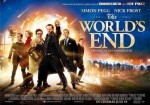‘World’s End’ a genre-busting mashup that tops Cornetto Trilogy

While this affirmation may incense the cult following of auteur Edgar Wright and his two collaborators Nick Frost and Simon Pegg, going into “The World’s End,” I wasn’t expecting much because of the strange indifference his previous films have left me with.
But after seeing “The World’s End,” the third installment of his so-called Cornetto trilogy, Wright’s devotion for cinema’s past, while forging a new identity as a distinct and original voice, became evident.
“The World’s End” takes its cues from Barry Levinson’s “Diner,” the 1956 science fiction classic “Invasion of the Body Snatchers” and a sprinkle of John Carpenter’s “They Live.”
The story is simple: five childhood friends reunite for a pub crawl back in their hometown. They hit 12 bars in one night eventually leading them to the last pub – aptly named The World’s End – but upon arriving, they sense the milieu of their quiet hometown seems strange and unfamiliar.
What happens next is a genre-busting mashup of alien invasion and slapstick comedy. But underneath the cacophony of laughter reveal notions of nostalgia, modern technology and the process of growing old are revealed. Pegg plays Gary King, a washed-up 40-something whose mind is stuck in 1990, though his body and the collective temperament of his friends have long moved on from their youthful exploits.
You want to hate King and his reckless abandonment, but his demeanor is a façade as he tries to deal with the concepts of domesticity and the yearnings for missed opportunities he once had in life.
King cannot forget the past, something his friends have managed to do so well.
The film’s strength is in the camaraderie among the men.
With King and his best friend Andy (Nick Frost) as the focal point, Wright instills new blood into the potent partnership of Pegg and Frost with Martin Freeman, who plays Oliver, a commercial real estate agent with a blue tooth device attached to his ear. Also along are Paddy Considine as Steven, an architect who still has a crush on Oliver’s sister, Sam (Rosamund Pike), and Eddie Marsan as Peter.
The first half of the film engrosses the audience with the contentious and bitter dynamics these men have for one another, more specifically their resentment toward Gary.
Wright takes his time with developing this complex relationship between the five men. Their history and their bond is the heart of the film, which makes viewers more engaged with what soon transpires.
Without giving too much away, aliens invade the small town, and its up to the boys to discover how this happened. Wright’s transition from character study to an onslaught of Jackie Chan-inspired action sequences gives us a new struggle for these men, the fight to stay human and not fall into the assembly line of comatose individuals that the aliens wish the human race to become.
Substituting the communist threat that “Body Snatchers” is thought to convey, Wright employs sentiments about modern technology and the disconnect it has produced toward human interaction.
Wright’s aliens invade to enhance the well being of humans, but seeing what they have done to their hometown, a choice to stay human is the only sensible alternative for King and crew.
Wright’s aesthetics that fans know so well from “Shaun of the Dead” and “Hot Fuzz” serve a distinct purpose in “The World’s End.” From the rapid close-ups of car doors being shut, beer-pouring down frosty mugs, facial gestures and of course the gore, they amplify the tension between the struggle for survival. Wright’s technical dexterity is in full bloom during this
supercharged escapade.
It’s not only the fight for human existence, but also a fight for the survival of Gary’s friendships, and his search for a purpose in an ever-changing world.
Grade: B+






